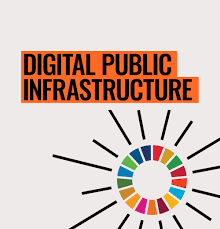Ahmedabad
(Head Office)Address : 506, 3rd EYE THREE (III), Opp. Induben Khakhrawala, Girish Cold Drink Cross Road, CG Road, Navrangpura, Ahmedabad, 380009.
Mobile : 8469231587 / 9586028957
Telephone : 079-40098991
E-mail: dics.upsc@gmail.com

Digital Public Infrastructures (DPIs)
News: Digital Public Infrastructures (DPIs) are likely to help propel India towards a $1 trillion digital economy by 2030, helping it to become an $8 trillion economy, a Nasscom report said.
About
• By 2030, DPIs will significantly enhance citizens’ efficiency and promote social as well as financial inclusion.
• According to the report, mature DPIs such as Aadhaar, UPI, and FASTag which have witnessed exponential adoption by 2022 would in the next 7-8 years offer an opportunity for further scalability, reaching even the most remote population.
• Mature DPIs have generated a value of $31.8 billion, equivalent to 0.9% of India’s GDP.
Digital Public Infrastructures (DPIs)
• Digital Public Infrastructures (DPIs) are digital platforms and systems that support the delivery of essential public services to citizens and businesses.
• They act as foundational layers, enabling various digital solutions to be built upon them and also act as digital highways facilitating seamless interactions between different stakeholders.
Present Status in India:
• India’s DPI ecosystem, known as India Stack, has made significant strides in recent years.
• India Stack is a set of open APIs and digital public goods that aim to unlock the economic primitives of identity, data, and payments at population scale.
Key DPIs include:
• Aadhaar: Unique digital identity for every resident.
• UPI: Real-time payment system enabling instant money transfers.
• eSign: Digital signature solution for online authentication.
• DigiLocker: Platform for storing and sharing digital documents.
• API (Application Programming Interface) Gateway: Standardized interface for accessing government data and services.
Significance/Achievements:
E Governance and Transparency:
• Improved Service Delivery: DPIs streamline government services, reducing manual processes and corruption, leading to greater efficiency and transparency.
• Citizen centric: DPIs empower citizens with better access to government services, information, and opportunities, promoting participation and accountability.
• Reduced Corruption: Transparency through online services and digital transactions minimizes room for corruption, promoting better governance practices.
Economic Impact:
• Financial Inclusion: DPIs like Aadhaar and UPI brought millions into the formal financial system, facilitating easier access to credit and financial services.
• Boost to Digital Economy: DPIs support digital transactions, e-commerce, and online businesses, accelerating economic growth and creating new opportunities.
Social Impact:
• Improved Public Health: DPIs can aid in healthcare delivery, disease surveillance, and telemedicine, enhancing access to quality healthcare in remote areas.
• Government initiatives like Ayushman Bharat Digital Mission and National Health Mission leverage DPIs in healthcare.
• Education and Skill Development: DPIs facilitate online learning platforms, digital content access, and skill development programs, fostering knowledge dissemination and improving employability.
• Hence, DPIs can play a crucial role in achieving Sustainable Development Goals (SDGs) in India.
Challenges:
• Digital Divide: Unequal access to the internet and digital literacy hinder widespread adoption.
• Data Privacy and Security: Concerns about data misuse and breaches require robust safeguards.
• Standardization and Interoperability: Ensuring different DPI components work seamlessly together remains crucial.
• Capacity Building: Upskilling government officials and citizens to leverage DPIs effectively is essential.
Measures:
• Focus on inclusion: Bridging the digital divide through initiatives like PM Gramin Digital Literacy Mission.
• Privacy and security: Strengthening data protection frameworks and ensuring responsible data governance.
• Enactment and implementation of Data Protection Act is needed on a priority basis, as underlined in the Puttaswamy judgement, 2027.
• Strengthening existing DPIs: Scaling up adoption and promoting innovation in their use.
• Developing new DPIs: Exploring areas like public health, education, and agriculture.
Way Ahead:
• Overall, DPIs hold immense potential to transform India’s digital landscape and empower citizens. Continuous assessment and adaptation are necessary to ensure DPIs remain relevant and effective.
• Addressing existing challenges and focusing on inclusive development are key to unlocking their full potential.

Address : 506, 3rd EYE THREE (III), Opp. Induben Khakhrawala, Girish Cold Drink Cross Road, CG Road, Navrangpura, Ahmedabad, 380009.
Mobile : 8469231587 / 9586028957
Telephone : 079-40098991
E-mail: dics.upsc@gmail.com
Address: A-306, The Landmark, Urjanagar-1, Opp. Spicy Street, Kudasan – Por Road, Kudasan, Gandhinagar – 382421
Mobile : 9723832444 / 9723932444
E-mail: dics.gnagar@gmail.com
Address: 2nd Floor, 9 Shivali Society, L&T Circle, opp. Ratri Bazar, Karelibaugh, Vadodara, 390018
Mobile : 9725692037 / 9725692054
E-mail: dics.vadodara@gmail.com
Address: 403, Raj Victoria, Opp. Pal Walkway, Near Galaxy Circle, Pal, Surat-394510
Mobile : 8401031583 / 8401031587
E-mail: dics.surat@gmail.com
Address: 303,305 K 158 Complex Above Magson, Sindhubhavan Road Ahmedabad-380059
Mobile : 9974751177 / 8469231587
E-mail: dicssbr@gmail.com
Address: 57/17, 2nd Floor, Old Rajinder Nagar Market, Bada Bazaar Marg, Delhi-60
Mobile : 9104830862 / 9104830865
E-mail: dics.newdelhi@gmail.com